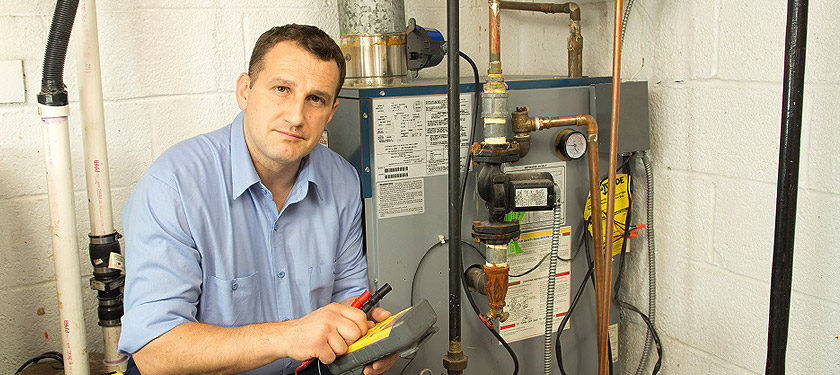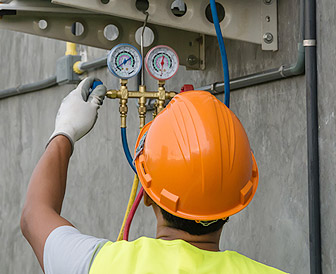
Furnace Installation
Your furnace plays a crucial role in maintaining a warm and comfortable home environment, shielding it from harsh winter temperatures. Although a furnace may not require your attention all the time, a malfunctioning or non-functional furnace can call for an immediate action in no time.
Modern furnaces are equipped with advanced technology, are constructed with high-quality material and more safety feature. However, like any other machinery the wear and tear on a furnace are inevitable over time. While it is crucial to perform regular annual servicing and maintenance for optimal operation, these efforts can only uphold peak efficiency for a limited duration. As time passes, the need for repairs becomes more frequent, resulting in higher heating bills and escalating repair expenses. As your furnace's efficiency diminishes, and issues become more frequent and costly, it becomes prudent to contemplate the replacement of your old furnace with a new, more efficient one.

DO YOU REALLY NEED A NEW FURNACE?
Deciding between continuing furnace repairs or opting for a replacement is a big decision with considerable cost implications. Sometimes furnace repairs might not be the most economical or efficient decision in the long run, especially when furnace is over 10 Years old. New furnaces involve a higher upfront cost but offer significant energy savings through enhanced efficiency and often comes with a great warranty. Ultimately, the decision involves weighing the immediate affordability of repairs against the long-term benefits of a more efficient and cost-effective heating system.

Award Winning Firm
Nemo enim ipsam voluptatem quia voluptas sit aspernaturip-sam voluptatem quia.

Professional Workers
Nemo enim ipsam voluptatem quia voluptas sit aspernaturip-sam voluptatem quia.

Licence & Insured
Nemo enim ipsam voluptatem quia voluptas sit aspernaturip-sam voluptatem quia.
Benefit of New Furnace Installation
Phosfluorescently engage worldwide methodologies with web-enabled technology. Interactively coordinate pro-active e-commerce via process-centric "outside the box" thinking. Completely pursue scalable customer.
DO YOU REALLY NEED A NEW FURNACE?
Deciding between continuing furnace repairs or opting for a replacement is a big decision with considerable cost implications. Sometimes furnace repairs might not be the most economical or efficient decision in the long run, especially when furnace is over 10 Years old. New furnaces involve a higher upfront cost but offer significant energy savings through enhanced efficiency and often comes with a great warranty. Ultimately, the decision involves weighing the immediate affordability of repairs against the long-term benefits of a more efficient and cost-effective heating system.
Identifying whether your furnace requires replacement or repair involves paying attention to several signs and symptoms. Here are some indicators that your furnace may need attention:
- Unusual Noises: Strange sounds such as banging, clanking, or squealing may indicate issues within the furnace.
- Inconsistent Heating: If some rooms are significantly colder than others or if you’re experiencing uneven heating, there may be a problem with the furnace.
- Increased Energy Bills: A sudden and unexplained rise in energy bills could be a sign of reduced efficiency, often linked to a malfunctioning furnace.
- Frequent Cycling: If your furnace turns on and off more frequently than usual, it may be a signal of an underlying problem.
- Poor Air Quality: Dust, soot, or an increase in respiratory issues might suggest problems with the furnace affecting indoor air quality.
- Age of the Furnace: If your furnace is older and has surpassed its typical lifespan (usually around 10-15 years), it may be prone to more frequent breakdowns and could benefit from an inspection.
- Visible Signs of Damage: Any visible damage, rust, or corrosion on the furnace should be addressed promptly.
- Foul Odors: Unpleasant odors, such as a burning smell or a rotten egg odor (indicating a gas leak), should be investigated immediately.
- Thermostat Issues: If the thermostat isn’t responding correctly or if there are temperature discrepancies, it may be a sign of a furnace problem.
If you notice any of these signs, it’s advisable to consult with a professional HVAC technician to assess and address the issue promptly. Regular maintenance is also key to preventing major problems and ensuring your furnace operates efficiently.



